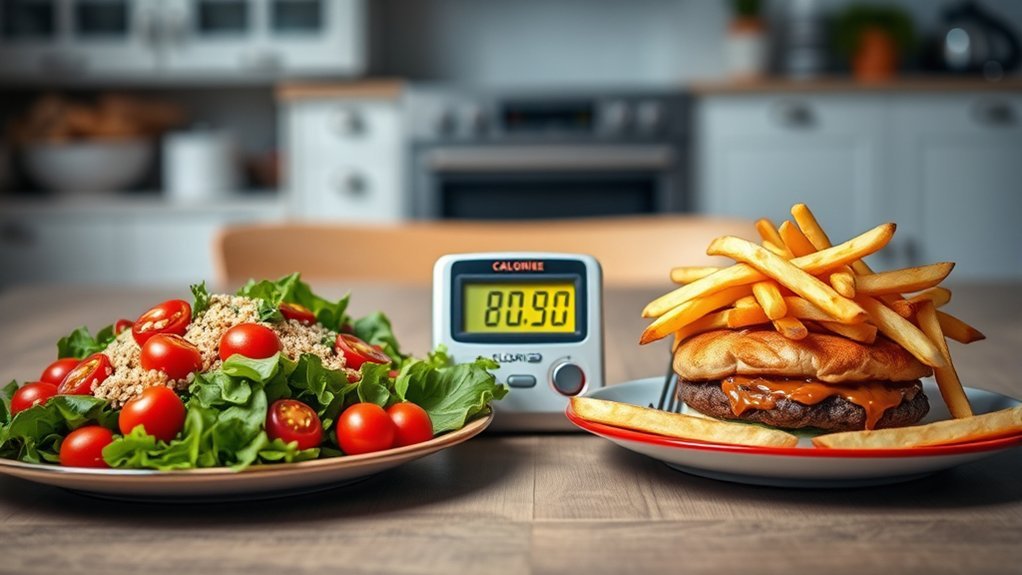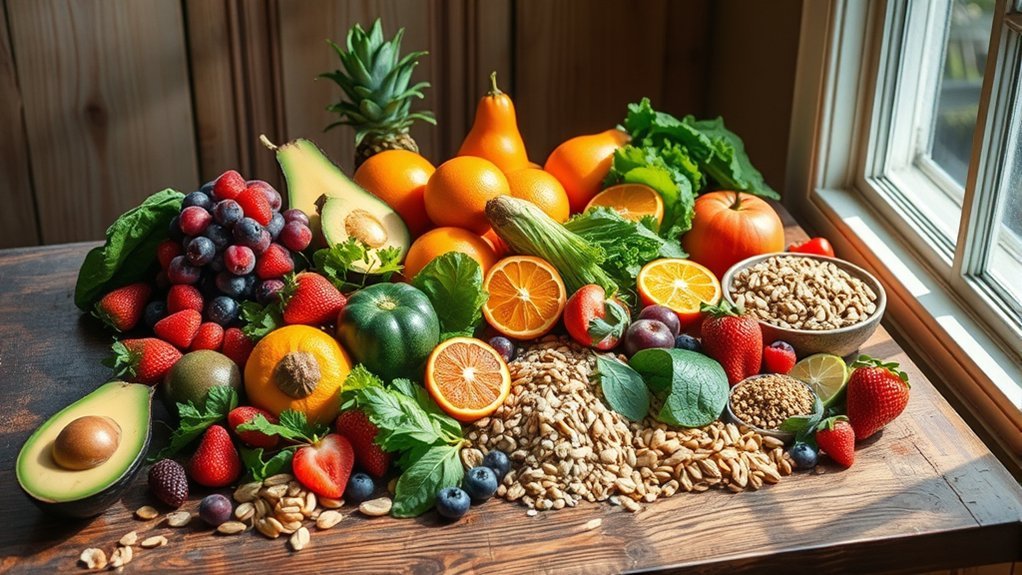When setting your weight gain targets, it’s vital to understand the do’s and don’ts that can either support or hinder your progress. By focusing on a gradual increase and prioritizing nutrient-dense foods, you can create a sustainable plan. However, it’s equally important to avoid unhealthy practices like excessive junk food. Want to learn how to effectively monitor your progress and guarantee you’re on the right track? Let’s explore these essential strategies.
Understand Your Caloric Needs

Before you can effectively set your weight gain targets, it’s essential to understand your caloric needs. Start by calculating your Basal Metabolic Rate (BMR), which represents the calories your body requires at rest. You can use online calculators for this, inputting your age, gender, weight, and height.
Next, consider your activity level to determine your Total Daily Energy Expenditure (TDEE). This includes calories burned during exercise and daily activities. To gain weight, you’ll need to consume more calories than your TDEE.
Aim for a surplus of 250 to 500 calories daily to promote gradual weight gain without excessive fat accumulation. Monitoring your progress regularly helps you adjust your caloric intake as needed, ensuring you stay on track toward your goals.
Focus on Nutrient-Dense Foods

To effectively reach your weight gain targets, focusing on nutrient-dense foods is essential, as these options provide the important vitamins, minerals, and macronutrients your body needs.
Focusing on nutrient-dense foods is crucial for achieving your weight gain goals with essential vitamins and minerals.
Instead of empty calories, choose foods that pack a nutritional punch. Here are four nutrient-dense foods to include in your diet:
- Nuts and seeds – High in healthy fats and protein, they’re great for snacking and adding to meals.
- Avocado – Rich in healthy fats, fiber, and various vitamins, it’s versatile for smoothies or spreads.
- Whole grains – Foods like quinoa and brown rice provide complex carbohydrates and fiber for sustained energy.
- Lean proteins – Chicken, fish, and legumes help support muscle growth and recovery.
Incorporate these options to maximize your caloric intake healthily.
Incorporate Strength Training

Incorporating strength training into your routine can greatly enhance your weight gain efforts by building muscle mass and boosting your metabolism. Regular strength training helps you gain weight more effectively by promoting lean muscle development, which in turn increases your calorie expenditure. Here’s a quick overview of the benefits:
| Benefit | Impact on Weight Gain | Recommended Frequency |
|---|---|---|
| Increased Muscle Mass | Higher weight gain potential | 3-4 times a week |
| Boosted Metabolism | More calories burned at rest | Consistent training |
| Improved Strength | Enhanced daily function | Every session |
Aim to focus on compound exercises like squats, deadlifts, and bench presses for ideal results. With commitment, you’ll see progress that aligns with your weight gain goals.
Stay Hydrated
Staying hydrated is vital for your overall health and can greatly impact your appetite control, making it easier to reach your weight gain targets.
Drinking enough water helps regulate your metabolism and can prevent unnecessary snacking.
Opt for water and nutrient-rich beverages to guarantee you’re meeting your hydration needs effectively.
Importance of Water Intake
While you may focus on diet and exercise for weight gain, neglecting your water intake can hinder your progress. Staying well-hydrated supports your overall health and helps your body function at peak efficiency.
Here are four reasons why water intake is vital:
- Nutrient Absorption: Water aids in the digestion and absorption of nutrients, allowing your body to utilize the calories you consume effectively.
- Muscle Function: Proper hydration improves muscle performance, which is essential when you’re engaging in resistance training for weight gain.
- Metabolism Boost: Drinking water can temporarily increase your metabolism, helping you burn more calories.
- Energy Levels: Staying hydrated maintains your energy levels, allowing you to work out harder and recover faster.
Hydration and Appetite Control
Hydration plays an essential role in regulating your appetite, as even mild dehydration can lead to feelings of hunger that may not be genuine.
When you’re dehydrated, your body may signal hunger instead of thirst, causing you to snack unnecessarily. To prevent this confusion, drink water consistently throughout the day. Aim for at least eight glasses, but adjust based on your activity level and climate.
Before meals, try drinking a glass of water; this can help you feel fuller and prevent overeating. Additionally, incorporating hydrating foods like fruits and vegetables can enhance your overall fluid intake.
Best Drinks for Hydration
Choosing the right drinks can greatly impact your hydration levels and overall health. Staying hydrated is essential, especially when aiming for weight gain.
Here are the best drinks to keep you hydrated:
- Water: The gold standard for hydration, it’s calorie-free and crucial for all bodily functions.
- Coconut Water: Packed with electrolytes, it’s a tasty alternative that replenishes lost minerals.
- Herbal Teas: Naturally caffeine-free and hydrating, they can offer additional health benefits depending on the herbs used.
- Diluted Fruit Juices: When mixed with water, they provide hydration along with vitamins and minerals without excessive calories.
Incorporating these drinks into your daily routine can help you stay hydrated and support your weight gain goals effectively.
Avoid Empty Calories
To effectively reach your weight gain targets, it’s vital to steer clear of empty calories that offer little nutritional value. These are often found in sugary snacks, sodas, and heavily processed foods.
Instead of filling up on these items, focus on nutrient-dense options like whole grains, lean proteins, healthy fats, fruits, and vegetables. They not only provide the necessary calories for weight gain but also supply vitamins and minerals important for overall health.
For instance, avocados and nuts are excellent sources of healthy fats that can boost your caloric intake without compromising nutrition.
Monitor Your Progress
Tracking your weight gain progress is a key component of achieving your goals. By keeping an accurate record, you can make informed decisions about your nutrition and exercise routines.
Here are four effective ways to monitor your progress:
- Weigh Yourself Weekly: Consistent weekly weigh-ins help you notice trends over time, rather than daily fluctuations.
- Keep a Food Journal: Documenting what you eat allows you to identify patterns and make necessary adjustments to your diet.
- Take Body Measurements: Measuring your waist, hips, and other areas can show changes that the scale may not reflect.
- Track Strength Gains: Monitor your workouts to guarantee you’re progressively lifting heavier or increasing endurance, which indicates muscle growth.
Be Patient and Consistent
When you’re aiming for weight gain, it’s crucial to embrace slow progress and set realistic goals.
Rushing can lead to unhealthy habits, so focus on tracking your journey to see the incremental changes.
Embrace Slow Progress
Although it might be tempting to rush toward your weight gain goals, embracing slow progress is essential for sustainable results. Quick fixes often lead to temporary gains, while a gradual approach helps your body adjust and maintain the weight.
Here are some practical tips to help you embrace slow progress:
- Track Your Intake: Keep a food journal to monitor your calorie intake and guarantee you’re on the right path.
- Set Small Milestones: Aim for incremental gains, like 0.5 to 1 pound per week.
- Focus on Nutrient-Dense Foods: Prioritize whole foods that offer high calories and essential nutrients.
- Celebrate Non-Scale Victories: Recognize improvements in strength, energy, and overall well-being, not just weight.
Stay patient and consistent; the results will follow!
Set Realistic Goals
Setting realistic goals is essential for successful weight gain, as it helps you stay patient and consistent throughout your journey. Aim for gradual increases rather than drastic changes. Remember, small, achievable milestones guarantee you don’t feel overwhelmed and keep your motivation high.
| Goal Type | Example |
|---|---|
| Short-term | Gain 1-2 pounds in a month |
| Medium-term | Increase caloric intake by 300 calories daily |
| Long-term | Build 10 pounds over six months |
| Adjustments | Reassess every 4-6 weeks |
Track Your Journey
How do you keep track of your progress while gaining weight? Monitoring your journey is vital for staying motivated and making adjustments. Here are some effective methods to reflect on:
- Daily Weigh-Ins: Step on the scale at the same time each day to track fluctuations and trends.
- Food Diary: Log what you eat, including calories and macronutrients, to guarantee you meet your intake goals.
- Progress Photos: Take photos weekly to visually document changes in your physique over time.
- Measurements: Record body measurements (waist, hips, etc.) to capture changes that the scale mightn’t reflect.
Being patient and consistent is key; progress takes time, and small adjustments can lead to significant results.
Stay focused, and celebrate your achievements along the way!
Frequently Asked Questions
How Quickly Can I Expect to See Weight Gain Results?
You can expect to see noticeable weight gain within a few weeks if you consistently increase your calorie intake and focus on strength training. Results may vary based on your individual metabolism and activity levels.
Is It Safe to Gain Weight Rapidly?
Gaining weight rapidly can feel like a rollercoaster ride, but it’s generally unsafe. Instead, aim for a gradual increase to minimize health risks, ensuring your body adapts properly while maintaining nutrient balance for overall well-being.
Can Supplements Help With Weight Gain?
Supplements can help with weight gain by providing additional calories and nutrients. Protein powders, meal replacement shakes, and creatine are effective options, but it’s essential to combine them with a balanced diet and regular exercise for best results.
Should I Consult a Doctor Before Starting a Weight Gain Plan?
Before starting your weight gain journey, picture your health as a thriving garden. Consulting a doctor guarantees your plan’s grounded in safety, aligning with your unique needs and preventing potential pitfalls along the way.
How Do Genetics Affect My Weight Gain Potential?
Genetics play an essential role in your weight gain potential, influencing metabolism, fat distribution, and appetite. Understanding your genetic predispositions can help you tailor nutrition and exercise plans for more effective weight management.
Conclusion
In your journey to healthy weight gain, think of it as nurturing a garden. Just as a plant needs the right soil, water, and sunlight to flourish, you need a balanced diet, strength training, and patience for growth. Focus on nourishing your body with nutrient-dense foods and avoid the quick fixes that yield empty results. Remember, consistent effort over time leads to lasting change, so give yourself the grace to grow at a steady pace.
